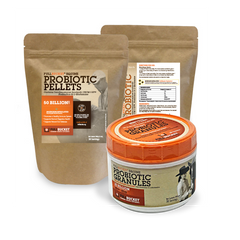Key Takeaways:
- Horse domestication puts our beloved animals at a distinct gut health disadvantage.
- New research regarding gut microbiome diversity in Przewalski’s wild horse shows that domesticated horses have much-less-diverse microbiomes, leading us to wonder about the evolution of the microbiome and what that means for our horses.
It wasn’t long ago that horses rarely had gut health problems. They ranged free, ate what they needed, and boasted a robust, happy array of gut microbes.
Interestingly, there are horses that still fit this description: The Przewalski’s Horse, a related species that humans have never been able to domesticate, has a remarkably diverse microbial ecosystem in its gut—aka microbiome.
“Researchers have taken stool samples from Przewalski horses and found these fascinating microbiomes,” says Dr. Rob Franklin, an equine internal medicine specialist and co-founder of FullBucket, a veterinary-strength supplement business based in Weatherford, Texas.
“The richness and diversity, it’s tremendous. They’ve got all these friendly bacteria and fungi, all interacting together to help the horse digest its food. Now, they compared that to a domesticated horse, and the richness and diversity pales in comparison.”
The gut microbiomes of wild mustangs also contain copious, diverse microbial populations.
“What that tells us is that the way that we care for the domestic horse has hampered its microbiome,” says Franklin. “We have not allowed that horse to digest its food normally because we’re not allowing it to roam free in a pasture and adapt to seasonal changes in grasses, we’re feeding it baled hay and processed grain sources that it’s not accustomed to. The domestic microbiome is not normal compared to that of this archeological specimen that’s still free-living and untampered with.”

A few Przewalski’s Horses live in zoos—still undomesticated, not even halter-broke, and free-ranging—and in one generation their progeny has lost that diversity that the wild Przewalski’s are able to maintain.
“This study really shows us that our domesticated horses, no matter how they are cared for, are not normal. If a species kept in a zoo can’t maintain its microbiome, how can we expect our modern athletes to cope with the husbandry we expose them to? A millenia-old GI tract is suffering from a loss of microbiome diversity and richness. We are responsible for caring for our horses’ gut health—just as we need to deworm, trim hooves, groom and feed. We need to steward the microbiome as it is a key to health.” says Franklin.
We always want the best for our horses and strive to help them feel and perform their best. So, how can we truly optimize their health and seek the balance found in Przewalksi’s wild horse?
We improvise and manage our animals with nature in mind. We offer them a forage-based diet, give them 24/7 access to fresh, clean water, and allow them as much turnout as is possible.
One way horse owners can restore gut health is by feeding prebiotics and a high concentration of microencapsulated probiotics that the horse can use.
Prebiotics are the fertilizer that allows healthy bacteria to survive and thrive, so that the microbiome can reestablish itself. Probiotics are live microbes that help improve digestion and supply nutritional benefits.
By adding these crucial ingredients to our horses’ diets, we now allow their GI tracts to cope with the influences of baled hay, commercial feeds, travel, stress, and medications that are necessary to care for a horse in the 21st century.
“We’re doing everything we can within our power to allow those horses to perform as well as possible,” says Dr. Keith Latson, an equine surgeon and FullBucket co-founder and director of operations. “It really comes down to our stewardship of the horse...providing the necessary probiotics and prebiotics to set them up for success.”
So what can you do? Check out FullBucket’s equine probiotic granules or veterinary strength probiotic pellets, the modern horse gut health supplement, for the right concentration of probiotics and prebiotics to support their gut microbiome.


